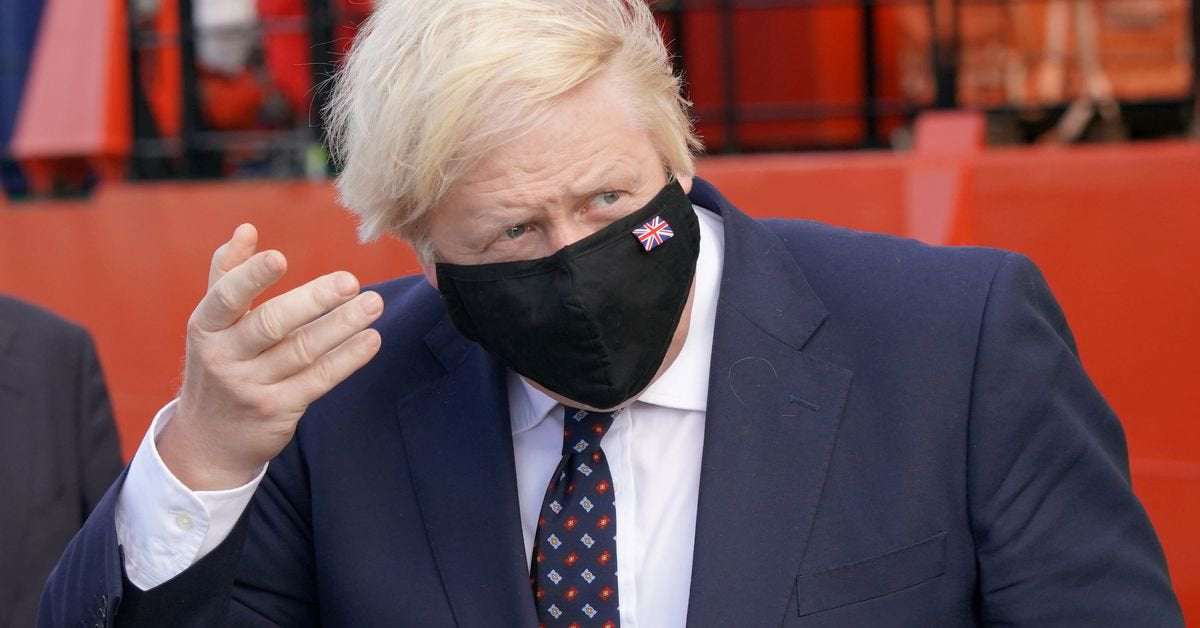Britain's Prime Minister Boris Johnson gestures before boarding the vessel Alba in Fraserburgh Harbour, which will transport him to the Moray Offshore Windfarm East during his visit to Scotland, Britain August 5, 2021. Jane Barlow/Pool via REUTERS
LONDON, Aug 15 (Reuters) - Nobody should bilaterally recognise the Taliban as the government of Afghanistan, British Prime Minister Boris Johnson said on Sunday, adding it was clear that there would be a new administration in the country very shortly.
"We don't want anybody bilaterally recognising the Taliban," Johnson said in an interview clip, urging the West to work together on Afghanistan through mechanisms such as the United Nations and NATO.
"We want a united position amongst all the like-minded as far as we can get one so that we do whatever we can to prevent Afghanistan lapsing back into being a breeding ground for terror."
Taliban insurgents entered Kabul on Sunday, President Ashraf Ghani left the country and the U.S. Embassy said the capital's airport, where diplomats, officials and other Afghans had fled, had come under fire.
"The (UK) ambassador is working round the clock, has been there at the airport to help process the applications," said Johnson.
Asked whether he would have expected the country to fall to the Taliban so quickly, he replied:
"I think it's fair to say that the U.S. decision to pull out has accelerated things."
Separately, Russia said earlier on Sunday that it does not yet recognise the Taliban insurgents as Afghanistan's new lawful authority, RIA state news agency reported.
Reporting by Costas Pitas; Editing by Alison Williams and Susan Fenton
Our Standards: The Thomson Reuters Trust Principles.

StephenHunterUK on August 15th, 2021 at 19:37 UTC »
Warning, long comment ahead.
Diplomatic recognition is when one nation says to another "you're the legitimate government of that country, here's the name of our ambassador. He'll be over next week." If there is no diplomatic recognition, this doesn't mean that governments don't talk to each other, it just tends to be through third parties. For example, Israel and Hamas conduct their discussions through Egypt.
If you don't recognise a government in the country, you may recognise a second government in exile. During the Second World War, many of the governments of the countries occupied by the Germans decamped to London and set up shop there, including their heads of state in some cases - the Ritz had no less than four monarchs staying there. In most cases, those governments returned home and re-established their administrations there - for example, Free France ended up creating what became the Fourth Republic. The notable exception was Poland, where the Western allies decided to recognise the Soviet-installed Polish People's Republic, but the government in exile remained in operation in London with a strong following from exiled Poles until 1990 when the return to democracy led to them handing over their credentials to the new Republic of Poland.
It is quite possible that Ghani will set up an Afghan government in exile in Tajikistan or somewhere else, as happened after the first time the Taliban took over.
Germany produced an interesting case. In 1949, the American, British and French zones of occupation were combined to form the Federal Republic of Germany, which created a Basic Law as a temporary constitution, set up its capital in Bonn and held free elections. It became known as West Germany by many.
That government remains the German government to this day, with the Basic Law now the permanent constitution (albeit changed somewhat) and the capital now moved back to Berlin.
The Soviet Union set up the German Democratic Republic, aka East Germany. This wasn't recognised by the Western Allies or West Germany, the latter of which refused to have diplomatic ties (with some exceptions) with any country that recognised the GDR. However, lower-level ties still continued - trains ran between the two countries and exports continued. There wasn't an East German embassy in London and if you wanted to visit the country on holiday, you had to go through a travel agency based in London who would deal with the visa paperwork. Or go over to Berlin, get a day visa via the East German checkpoint opposite Checkpoint Charlie and make further arrangements in East Berlin.
Western Allied soldiers were allowed to travel freely in all of Berlin as per the occupation agreement and it was common for GIs to pop over East for some sightseeing in their jeeps. You also had military trains and vehicles travelling down what is now the A2 from Marienborn onwards to West Berlin. Those soldiers were under orders to only acknowledge the authority of the Soviets at the checkpoint, not the East Germans. If a GDR Grenzer asked to see your papers, you were to insist on speaking to a Soviet officer. The same applied at Checkpoint Charlie. The famous tank standoff there arose when East Berlin police stopped a vehicle carrying American occupation plates.
In the early 1970s, West German Chancellor Willy Brandt (for whom the new Berlin airport is named) established diplomatic relations with the GDR, although they set up "permanent missions" in each other's country not embassies. This caused a fair bit of upset among the more conservative parts of the German population. The rest of the Western powers followed suit once this was done.
TLDR: Governments sometimes don't talk with other governments.
ILoveButtz on August 15th, 2021 at 18:28 UTC »
Well unfortunately they're the ones running the place now.
CrocTheTerrible on August 15th, 2021 at 17:50 UTC »
I mean are we gonna ignore the assumption that most people in “Afghanistan” don’t even recognize their own country as existing. Don’t they refuse to align themselves with being afgani and instead relate to their own tribal ties, or something like that?